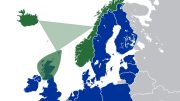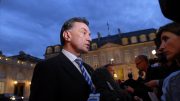The coronavirus pandemic is testing leaders, governments, parties and political systems everywhere, writes Geoff Kitney, and the global health crisis may give Beijing a big advantage in the battle for economic supremacy.
Behind the bold and grand vision which led to the creation of the European Union was a much more prosaic reality. The story of the evolution of the EU, since the first Treaty to create a united Europe was signed in Paris in 1951, has been more a story of “muddle through” than of enlightened leadership.
There have been many crises in the seven decades since Robert Schuman first proposed the creation of a supranational entity to pool European coal and steel production which have been accompanied by dire predictions of the end of the European project. Always, when it seemed all hope may be lost, a formula has been found which allows all the member states to pronounce that their demands have been met, an agreement has been signed and the Union will go on, from strength to strength.
In the end, working together has always been seen as better for the member states than going it alone, with the one recent and notable exception of Britain and Brexit.
But now a test of an unprecedented dimension is facing Europe.
This will surely be a test of the EU’s ability to rise to the challenge of agreeing on a Europe-wide framework within which a combination of national and shared actions result in the suppression of the virus and the salvation of the economy.
The coronavirus – COVID-19 – is sweeping Europe, creating a health crisis not seen in living memory. Tolls of infections and deaths have grown exponentially. No border has proven impenetrable. This is a Europe-wide crisis, part of a global crisis.
But this virus has done what no other crisis has done since the beginning of the European project. It has forced the member nations of the European Union to shut their borders to their non-national, fellow European citizens. The national states of Europe have been forced to close borders not enforced since the single market compelled them to take their borders down. Nationalists are certain to seek to make closed-border virus responses permanent ones.
The requirement that membership of the EU compels of its members – to share sovereignty and destiny – has been suspended as the member states attempt to defend their own nationals from the virus. The EU, from its headquarters in Brussels, has been floundering, both in terms of its ability to help the member states deal with the virus but also in explaining its failure to anticipate, and having the capacity in reserve for dealing with, such a continent-wide pandemic.
Comparisons are being drawn with Asian countries such as South Korea and Singapore which, after the SARS epidemic in 2003 (which affected just 26 countries, according to the World Health Organization), developed strategies – including building up reserve medical equipment supply chains – which have been quickly mobilised in response to the Coronavirus. Why did the EU not plan for such a worst-case scenario?
What the political consequences will be of the actions of national governments and the EU itself in response to the virus are impossible to predict at this early stage. While the crisis is a medical emergency and its impacts continue to spread, thinking through the political outcomes is impossible. “Muddle through”, though, would seem to be no way to bring this crisis to a satisfactory conclusion.
This will surely be a test of the EU’s ability to rise to the challenge of agreeing on a Europe-wide framework within which a combination of national and shared actions result in the suppression of the virus and the salvation of the economy.
New guidelines today that protect companies and infrastructure in this crisis against foreign takeovers. We help Member States screen offers from outside Europe. 🇪🇺will remain open to foreign direct investment but we need to balance it with our responsibility to protect. pic.twitter.com/9fxVMt8Kqz
— Ursula von der Leyen (@vonderleyen) March 25, 2020
Political impacts are ultimately likely to be the most important consequences of the coronavirus pandemic.
But it won’t just be about how the European Union emerges from the crisis that will become the big political question of the future. The pandemic is testing political leaders, governments, parties and political systems everywhere.
In Europe, in fact, politics has largely been set aside as all possible resources are directed at trying to slow and ultimately contain the virus.
In the European country where, initially, politics was a big factor in the response to the arrival of the virus – the United Kingdom – Prime Minister Boris Johnson and his advisers at first considered a laissez faire-style preference for allowing the virus to run its course and develop herd immunity. But warnings of a catastrophic death toll saw Johnson set aside his own libertarian inclinations to adopt heavy state intervention.
The national states of Europe have been forced to close borders not enforced since the single market compelled them to take their borders down. Nationalists are certain to seek to make closed-border virus responses permanent ones.
Politics, however, is looming ever larger in the response of the United States to the virus.
President Donald Trump, himself initially all over the place in terms of his own thinking about how best to deal with the virus threat, has been succumbing to pressure from the right-wing of the Republican Party and from wealthy, corporate America, to resist the total lock-down policies being adopted in most of the rest of the world.
In a dramatically risky – and potentially catastrophic – assertion of his “America First” philosophy, Trump has been talking of the need to put the health of the US economy first and the health of his people second. To the horror of health and virus experts, Trump had said he wanted the US economy “open for business” by Easter. He has backed off this now, but remains determined to get economic activity going again quickly, even at the risk of the pandemic not being under control.
Trump’s “crash through” thinking is, in part, driven by a rejection of anything that might be seen as “European” thinking and is also a reaction to a powerful group of right-wing, arch-capitalists and libertarians who see the policy of shutting down people movements to avoid the spread of the virus as a surrender to soft US liberals and to big state interventionists.
This thinking was encapsulated by a call from Texas Republican Dan Patrick for older Americans to be prepared to risk dying for the sake of maintaining economic output. Don’t sacrifice the economy for the sake of saving old people was his stark and disturbing message.
Trump and his supporters clearly are alarmed at the possibility that the economic impact of the virus and the measures to contain it will damage his chances of re-election in November – and that a Democrat President would re-instate much of the regulation and intervention which Trump has rolled back.
In fact, the coronavirus pandemic and the extent and importance of state intervention to deal with it is certain to open a big new front in the ideological divide between free market capitalists and pro-state intervention social democrats.
Similarly, defenders and promoters of globalism, open borders and international trade face new battles with nationalists and protectionists, a contest in which the world’s poorest people have a huge stake but no say.
In geo-politics, if the US economy is smashed as a result of Donald Trump’s high-stakes gamble of trying to revive economic activity in the midst of the virus crisis, it could suddenly and dramatically shift the balance of the US-China battle for global power and influence China’s way. China (and Russia) are trying to play the international leadership role that Trump has vacated – and risks further undermining.
China is already preparing to re-boot its economy, signalling that it will announce a mega-stimulus package to coincide with the annual national people’s congress, now scheduled to be held in Beijing from April 18.
China is also reaching out to as many countries as possible to assist them in dealing with their coronavirus challenges, sending teams of doctors and medical supplies. This contrasts with the Trump administration’s inward, isolationist approach and the fact that the US is desperately short of essential medical supplies and has a dysfunctional health system.
A big factor in Trump’s decision to potentially gamble the health of his people on a quick restart of the US economy is undoubtedly his concern that China may already have gained a big advantage. It is also why the Trump administration has been attacking China for its deliberate, early cover-up when the virus first emerged in Wuhan.
But if Trump is miscalculating and the US spread of the virus delays the economic recovery, then the global health crisis could give China the chance for a great leap forward in its plan to gain global political and economic leadership. It also gives Russia the chance to make trouble.
For the immediate future, the focus and priority of policy makers and citizens must be surviving the pandemic with as little loss as possible. But look a little further ahead and it’s easy to imagine a world transformed.

Headline image credit: Lightspring/Shutterstock.com




